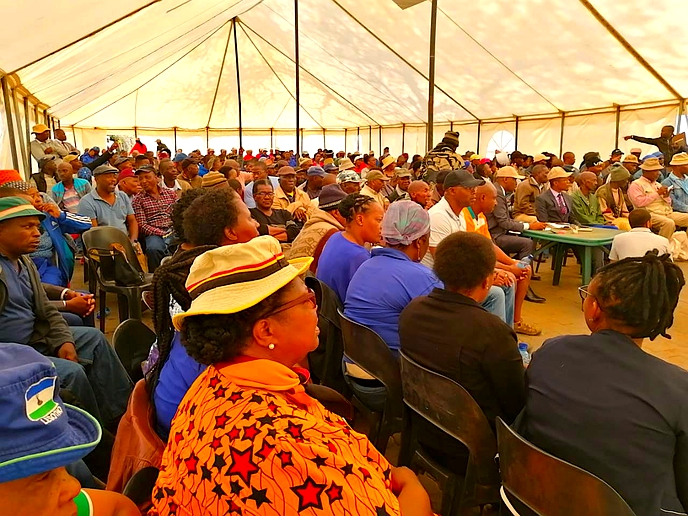MASERU - When in 1989 ’Mapakiso Makhema married the man of her dreams, all she pined for was a baby to seal a union she believed was God-send. She reviled the thought of delaying motherhood until her old age, which most professional working women opt for, to create space for the realisation of their dreams in the corporate world.
health
Oct. 10, 2019
LINEO MABEKEBEKE
5 min read
Dispelling societal infertility myths

But as a housewife, she wanted to have a child at the most earliest convenience. However, not being able to get pregnant within the first six months of her marriage was frustrating, but not alarming, according to the now 54-year-old woman. She made peace with her reality, knowing that most couples only conceived after making several tries.
“When the one-year mark passed and went, I was concerned but did not take any concrete steps towards finding answers from medical doctors as to why I could not conceive; I was young and healthy after all,” says Mrs Makhema.
Despite this, since she was a young recently married woman, she was haunted by family and societal expectations; at this time already having to fend off village gossip and coated personal attacks hurled at her. But she was still convinced from certain quarters that it was fine to postpone childbearing.
Everywhere she looked, though, culture determined that she should have had a baby by now. She says she was troubled by images of older women cradling their babies. This brought reality closer to home, now aged 27 and three years into a marriage she had entered into at 24 years she had to find out what was wrong with her. But then, even at this time she still thought and strongly believed she could bear a child. Just like any other woman, her family demanded that of her, her community demanded that of her.
Mrs Makhema recalls that around that time she visited a medical doctor to establish the real reasons it was taking her forever to bear a child, and what she was about to learn from her medical report was something she was never prepared for. She was told she could never have babies of her own, she was infertile! Unable to accept the terrifying news, the devastated woman, asked her husband to also go for a medical check-up.
“I was thinking maybe it could be him who couldn’t give me children, but he came back with a clean bill of health. I was the problem. Indeed I was the infertile one,” she sadly remembers. She adds: “I discovered that my ovaries had a problem which couldn’t allow me to conceive.
“Having endured cold multiple hands of several specialist doctors leading me through a complex web of possible bodily malfunctions, I eventually had to come to terms with my problem, I was infertile, I couldn’t have children. We couldn’t have children of our flesh and blood.” At this stage, the couple had cried rivers of tears trying to come to terms with the situation, always thinking of what to do next and which doctor to consult again.
But it all ended with the same result, Mrs Makhema says, “and we had to make peace with our reality, a painful acceptance of what life had thrown at us”. “Accepting that what the future held for us remained a surprise, and that things did not happen according to our will and want,” she continues.
She says beginning then she has lived to give hope to all she knew, who faced similar problems, for them to realise and accept the challenges that come with infertility. “Failure to bear a child does not translate into a cursed life but a medical condition that one just becomes unfortunate to have.
“I remain optimistic that by speaking publicly about my situation, experiences and the failed cycles in trying to conceive; the physical and psychological risks and trauma that accompanied each step, others will begin to speak out, accept their situation as well and help others to embrace their situations too.”
A gynaecologist in the ministry of health, Dr James Ger, however, puts women’s sense of guilt at bay. He says infertility does not only affect women, adding “about half of the causes of infertility are due to, or include male factors. The commonest conditions affect the reproductive age group between 20 and 45 years”. The doctor notes that infertility is neither a male nor a female factor and that for a couple to be able to have a baby both have to be medically well.
Enjoy our daily newsletter from today
Access exclusive newsletters, along with previews of new media releases.
For a long time, he says it has been assumed that women were the ones at fault. “But this has been disproved by recent scientific findings, and up to this far, the problem affects both men and women equally,” Dr Ger says. In Africa he says some communities’ traditional, cultural and religious practices are linked with higher levels of preventable causes of infertility in women.
Some of the contributing factors to infertility, particularly in women, could be poor nutrition, unsafe abortions, exposure to smoking and other environment pollutants, as they at a later stage cause problems with the fallopian tubes, including blockages and an increased risk of ectopic pregnancy, the doctor warns.
He says smoking and alcohol intake in men are prominent factors, although this effect is usually temporary. He appeals to men to avoid riding motorbikes, immersing in hot tubs and steam baths; advocating for the use of showers and wearing loose pants to boost sperm count. As untreated infections can lead to infertility, he advises women to have regular check-ups, see the doctor early and regularly to see if they feel unwell.
Mrs Makhema’s plight, her conviction that women need to be rid of stigma brought by societal expectations, is what makes campaigners of the calibre of the First Lady, Dr ’Maesaiah Thabane, need to advance the call on all sectors of society to join hands to uproot the stigmatization of all women shorn of human honour because of infertility. Dr Thabane, in a recent public address said it was arduous to daily witness the disrespect hurled at women who cannot bear children by both their friends and families, indicating that though infertility was a problem for women, the stigma attached to it was not directed at them as females, but also on men.
Recently appointed international organization, Merck Foundation, ambassador in Lesotho, Dr Thabane pledged to enjoin all partners to help in the fight against the infertility stigma. The Merck Foundation is a philanthropic organisation that aims to improve the health and wellbeing of people and to advance their lives through science and technology.
Its efforts are primarily focused on improving access to innovative healthcare solutions in underserved communities, building healthcare and scientific research capacity and empowering people with a special focus on women and youth. The foundation raises awareness of disease prevention and early detection through access to information, health and change of mindset, expanding professional capabilities in scientific research, technology and healthcare.
Tailored for you






